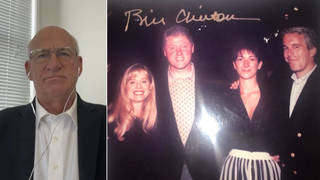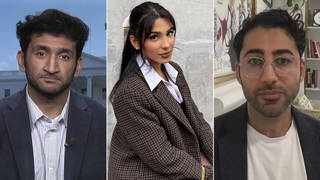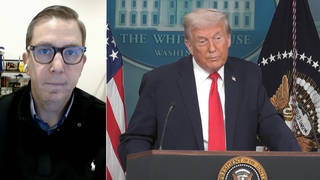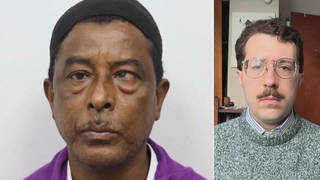
President Donald Trump has signed a wave of pardons for people convicted of fraud, including a Virginia sheriff who took tens of thousands of dollars in bribes and a reality TV couple who evaded millions in taxes after defrauding banks. Last month, Trump pardoned a Florida healthcare executive convicted of tax evasion for stealing nearly $11 million in payroll taxes from the paychecks of doctors and nurses. Many of Trump’s pardons have gone to supporters of his or those who made political donations to the president.
“These pardons are not indiscriminate,” says constitutional lawyer Bruce Fein. “They’re targeted to help people who are politically his supporters, raise money for him or otherwise.”
Transcript
AMY GOODMAN: This is Democracy Now!, democracynow.org. I’m Amy Goodman.
We end today’s show with a slew of pardons President Trump has issued, many this past week. In one case, Trump pardoned Scott Jenkins, a former Virginia sheriff and longtime Trump supporter, convicted on corruption charges after undercover video showed he accepted over $75,000 in bribes.
In another case, Trump pardoned the former reality show couple Todd and Julie Chrisley after they were sentenced to long prison terms for evading taxes and defrauding banks of more than $30 million. The couple’s daughter helped campaign for Trump. She requested the appeal on Fox News.
This comes as Trump loyalist Ed Martin has a new role as the Justice Department’s pardon attorney, after he failed to win Senate approval to become District of Columbia’s top prosecutor.
For more, we go to Washington, D.C. We’re joined by Bruce Fein, constitutional lawyer, former associate deputy attorney general and general counsel of the Federal Communications Commission under President Ronald Reagan, author of Constitutional Peril: The Life and Death Struggle for Our Constitution and Democracy.
Bruce, thanks so much for joining us. Why don’t you go through these pardons with us? Talk about the Virginia sheriff, talk about the reality TV couple, what they were imprisoned for, and what it means that they’ve been freed, not to mention fines worth millions of dollars being forgiven.
BRUCE FEIN: Well, in the two cases you mentioned, the sheriff was convicted of basically using his office to raise money through bribes, $75,000, to give favors to friends. The other case concerned tax evasion and fraud, the kinds of crimes that Mr. Trump himself has been under attack for.
I think that if you look in the broader sense, Mr. Trump is trying to create an aura of incredulity about the legitimacy of the criminal justice system, at least with regard to the pardons of these slew of white-collar offenses, and sometimes they’re political allies, as well. We just learned today in the newspapers a former congressman, former governor of Connecticut also pardoned. And I think that Mr. Trump recognizes that he’s losing overwhelmingly in the courts now, and that’s why he’s even turning on the Federalist Society and Leonard Leo, because he believes when he loses in the United States Supreme Court, he’s going to need a political reason for why he’s losing, and he’s trying to cast aspersion, I believe, on the legitimacy of the entire justice system. That’s why these pardons are not indiscriminate, because they’re targeted to help people who are politically his supporters, raise money for him or otherwise, which is very dangerous.
I want to add this: The framers understood the possibility that the pardon power would be abused. There was an exchange in the Virginia ratification debate between James Madison and George Mason. And Mr. Madison, when Mr. Mason said, “Well, what if the president uses his pardon power to help his political friends? That could be very, very dangerous. Why are we endowing the president with such pardon power?” — and Mr. Madison said, “Well, if the president uses pardons to help his political friends or personal friends, certainly the House will impeach, and he will be removed from Congress,” because it’s very difficult for an individual citizen, you or me, to have standing to challenge a pardon.
Unfortunately, Congress has turned into an ink blot. It has no spine. And so, that remedy is gone, which I think underscores the importance, if we’re going to have any kind of pushback, of public opinion saying we need the law to be enforced even-handedly.
AMY GOODMAN: I want to ask you about Paul Walczak. In April, President Trump pardoned him, the Florida healthcare executive convicted of tax evasion for stealing nearly $11 million in payroll taxes from the paychecks of doctors and nurses. The jury found him guilty after prosecutors showed he used the money to finance a lavish lifestyle. Walczak is the son of Betsy Fago, a healthcare entrepreneur and Republican Party donor. Trump pardoned Walczak three weeks after Fago attended a million-dollar-a-plate fundraiser at Mar-a-Lago. And he also pardoned or forgave the fine of something like $4 million that he’d have to pay in addition to serving time in jail. The significance of this, Bruce?
BRUCE FEIN: Well, at least it has the appearance of bribery. You’re raising money, and then, shortly after you raise money, then comes the pardon. And we know at least one of the offenses that justifies impeachment is bribery, even if it’s indirect. I think this is very dangerous.
But I want to underscore, Mr. Trump is not the first one who’s abused the pardon power. He’s had to take it a different scale, I think. We have Joe Biden and Hunter Biden. We have, remember, Marc Rich and William Jefferson Clinton and Roger Clinton. And even George H.W. Bush, he pardoned the Iran-Contra defendants, including Cap Weinberger. So it’s been abused before, but it’s taken to a scale now where it threatens to undermine the entire legitimacy of the criminal justice system.
And you mentioned earlier Ed Martin, which is really quite alarming, since Mr. Martin said, “I am going to use my position not to just go after people I think committed crimes, but to stigmatize them. Even if we can’t convict them, we want to harass them, make them lose their reputation.” It’s a danger that Justice Robert Jackson, a former attorney general, warned against in 1940, because the laws are very vague. And here we have a member of the Justice Department saying, “We’re coming after you, even if we can’t prove that you’re guilty of a crime, just to harass you and give you a bad name.” That clearly is an abuse of the obligation to faithfully execute the laws. Typically, you have an obligation in the Justice Department not even to begin an indictment unless you believe you can prove guilt beyond a reasonable doubt. And now we have a very, very low threshold for beginning an investigation, that probably will go nowhere other than tarnish reputations.
AMY GOODMAN: Well, Bruce Fein, I want to thank you very much for being with us. You mentioned Martin. Politico reports Martin spent his first week on the job reviewing pardon applications of January 6 insurrectionists, including Oath Keepers founder Stewart Rhodes, seeking to have President Trump convert their commuted sentences into full pardons. Bruce Fein is a constitutional lawyer, former Reagan attorney, was associate deputy attorney general and general counsel of the Federal Communications Commission under President Ronald Reagan.
That does it for our show. Happy birthday to Angie Karran! And check out our website for full-time jobs: a senior headline news producer, director of audience and director of technology. Go to democracynow.org/jobs. That does it for our show. I’m Amy Goodman. Thanks for joining us.














Media Options